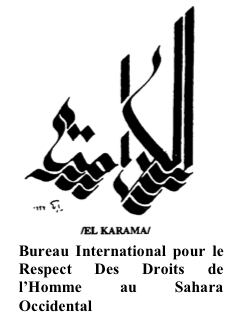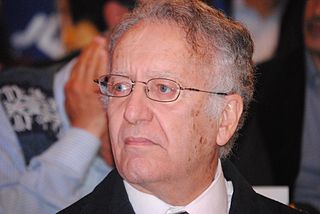 |
|---|
Human rights in Senegal are generally better respected than in other countries in the continent, but cases of violation are still regularly reported.
 |
|---|
Human rights in Senegal are generally better respected than in other countries in the continent, but cases of violation are still regularly reported.
The death penalty was abolished in 2004.
The Charter of Human Rights and Freedoms, also known as the "Quebec Charter", is a statutory bill of rights and human rights code passed by the National Assembly of Quebec on June 27, 1975. It received Royal Assent from Lieutenant Governor Hugues Lapointe, coming into effect on June 28, 1976. Introduced by the Liberal government of Robert Bourassa, the Charter followed extensive preparatory work that began under the Union Nationale government of Daniel Johnson.

Communist Youth of Ivory Coast is a political youth movement in Ivory Coast. JCOCI is the youth wing of the Revolutionary Communist Party of Côte d'Ivoire.

The 2001 About–Picard law [abu pika:r], officially Law No. 2001-504 of June 12, 2001, aimed at strengthening the prevention and repression of sectarian movements that undermine human rights and fundamental freedoms is French legislation passed by the National Assembly in 2000. The law is targeted at sects and movements deemed cultic that "undermine human rights and fundamental freedoms", as well as "mental manipulation". The law has caused controversy internationally, with some commentators alleging that it infringes on religious freedom while proponents contend that it reinforces religious freedom.
The Gayssot Act or Gayssot Law, enacted on 13 July 1990, makes it an offence in France to question the existence or size of the category of crimes against humanity as defined in the London Charter of 1945, on the basis of which Nazi leaders were convicted by the International Military Tribunal at Nuremberg in 1945–1946.

Salimata or Salamata Sawadogo Tapsoba is the former chair of the African Commission on Human and Peoples' Rights. She is also a magistrate, and, the Ambassador of Burkina Faso to Senegal, Mauritania, Guinea, Cape Verde and Gambia. She is also a member of the Jurist Women's Association of Burkina Faso.

Gerard Niyungeko was a Judge of the African Court on Human and Peoples' Rights, a position he was appointed to in 2006.

BIRDHSO is a Switzerland-based human rights organization campaigning against the human rights violations in Western Sahara. It has also delegations in France, Italy and Spain.
The Commission nationale consultative des droits de l'homme is a French governmental organization created in 1947 by an arrêté from the Ministry of Foreign Affairs to monitor the respect for human rights in the country. It may acts as counsellor for the government and propose laws, and then survey the application of governmental measures and laws voted in Parliament.
Trade unionism is a powerful force in the politics, economy, and culture of Senegal, and was one of the earliest trades union movements to form in Francophone West Africa.
The Human Rights League was founded in Belgium on 8 May 1901, after the in 1898 established Ligue des Droits de l'Homme in France. The Belgian initiative came from Eugène Monseur, a professor at the Université libre de Bruxelles.

Yadh Ben Achour is a Tunisian lawyer, expert on public law and Islamic political theory. President of the Higher Political Reform Commission of Tunisia, he is then member of the United Nations Human Rights Committee.

Sidiki Kaba, is a Senegalese politician currently serving in the fourth Sall government.

Hassib Ben Ammar was a leading Tunisian politician and journalist/editor. He was a powerful campaigner for human rights.

Joseph Yacoub is a historian and political scientist of Assyrian origin. His family moved from Salmas-Urmia, district in Iranian Azerbaijan and took refuge in Georgia during the First World War. From Tiflis/Tbilissi his family migrated to Syria which was during this time under French Mandate. His mother tongue is Aramaic and his first environment language is Arabic.His working language is mostly French.
The Tunisian Association of Democratic Women is a Tunisian feminist association which was founded in 1989.

Codou Bop is a Senegalese sociologist, journalist and women's rights activist who also engages against gender violence in Sub-Saharan Africa.
"Necessary in a democratic society" is a test found in Articles 8–11 of the European Convention on Human Rights, which provides that the state may impose restrictions of these rights only if such restrictions are "necessary in a democratic society" and proportional to the legitimate aims enumerated in each article. According to the Council of Europe's handbook on the subject, the phrase is "arguably one of the most important clauses in the entire Convention". Indeed, the Court has itself written that "the concept of a democratic society ... prevails throughout the Convention". The purpose of making such claims justiciable is to ensure that the restriction is actually necessary, rather than enacted for political expediency, which is not allowed. Articles 8–11 of the convention are those that protect right to family life, freedom of religion, freedom of speech, and freedom of association respectively. Along with the other tests which are applied to these articles, the restrictions on Articles 8–11 have been described as "vast limitations", in contrast to American law which recognizes nearly unlimited right to freedom of speech under the First Amendment.
Samantha Besson, born on March 30, 1973, in Beirut, is a law professor specialized in Public International Law and European Law. She holds the chair "The International Law of Institutions" at the Collège de France (Paris) and is a part-time professor at the University of Fribourg (Switzerland).
Amnesty International Belgique francophone is the French-speaking Belgian section of Amnesty International (AIBF).